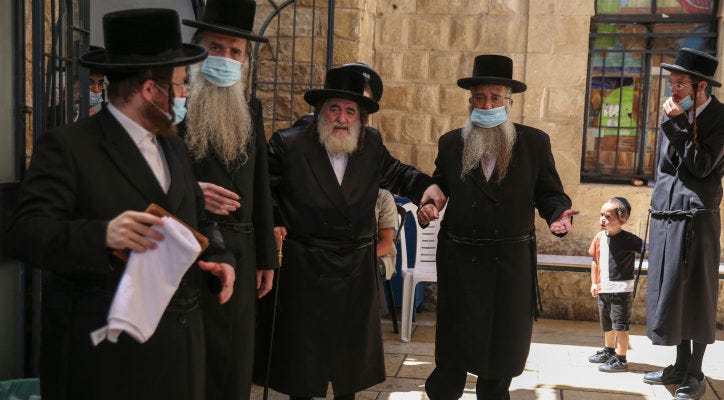The Chassidic Coronavirus Policy

As the pandemic proceeds, a clear pattern of behavior can be seen among many (though not all) chassidic groups, which also extends to certain parts of the Lithuanian charedi community, of ignoring all coronavirus restrictions and guidelines. It's gotten to the point that it's actually been explicitly described by chassidic spokesmen as a deliberate, planned strategy, incorporating assessing all the data and statistics. (Though personally I think it's far more likely to be an ad hoc justification, not a planned strategy; careful strategic planning, with input from experts, just doesn't happen in those circles.)
Charedim are already more vulnerable to coronavirus, due to their living in high-density communities. With the addition of a policy to ignore precautions, the infection rates have soared. Per capita, they have five times more cases than the general population, and despite being only 12% of the population, they currently account for 45% of all cases.
So, what is the basis for their policy? We've already seen a "psak halachah" from Rav Moshe Shaul Klein of Bnei Brak. Now there is also a very revealing interview with Rav Pinchas Friedman, head of the Belz Kollel network, who is much more explicit. And his position is not entirely unreasonable.
Rav Friedman begins by saying that he is not giving his opinion on what other communities should do. He is only presenting the position of Belz. Which is that the chassidic way of life is of paramount importance. Their entire lifestyle is based on people crowding together, especially around the Rebbe, in the Shul and Beis HaMidrash. If they have to sacrifice a very small number of people to maintain their culture, so be it.
He makes the valid point that Judaism does maintain that there are things more important than human life. One is required to sacrifice one's life rather than transgress the three cardinal sins. At a time of religious persecution, one is required to sacrifice one's life rather than wear non-Jewish clothing! So at a time of great threat to their way of life, with a risk of youth dropping out of their system entirely, they can risk a very, very small number of victims.
I don't personally agree with how they perform this cost/benefit analysis. But I don't think that it's inherently problematic. More to the point, it's something that every community and society does. We don't always minimize risk to human life as much as possible. We all rate some things as being more valuable, even at small risk to human life. We have speed limits that could be substantially lowered but aren't. We legalize alcohol. Even bris milah is not entirely without risk. So I think that chassidim are entitled to choose to take a small degree of risk, in order to maintain their way of life.
Except.
Except that there are two problems.
First is that both Rav Klein and Rav Friedman claim to find it important to stress that the disregard for precautions is only insofar as the precautions interfere with Torah and prayer. Otherwise, they insist, it is important to observe the precautions. But we just don't see their communities actually stressing that. They don't instruct their followers to put on masks and try to socially distance when they leave shul or when they are shopping. (And it's hard to see how they can justify a maskless, crowded wedding as being an essential part of maintaining their spiritual lifestyle.) They don't show any concern at all for any precautions, ever. Why not?
I'm not sure of the answer, though I can think of several possible contributing factors. It might be that it's difficult to simultaneously fight against observing precautions in some contexts, and in favor of precautions in other contexts. It might be that they are only professing to care when it's in print, for PR purposes, but that they actually don't care at all, because of genuine or wilful ignorance. Or perhaps there is some other reason.
The second problem is that no community is hermetically sealed from the rest of the country. When charedi groups say that they are willing to pay the price for avoiding restrictions, they are also making other people pay the price. Disregarding the rules means more rapid exposure of more people, some of whom will get sick enough to require hospitalization. They have already begun to overwhelm the medical system. Which means that people beginning chemotherapy aren't getting it. And others who would ordinarily be admitted to hospital have no place to be admitted to, and there are insufficient doctors and nurses to deal with everyone. That means people dying. With certainty.
There is blatant disregard for the rest of the population of the country. Of course, this is nothing new - this lack of "Klal Yisrael consciousness," as Yonasan Rosenblum calls it, is a defining feature of charedi society. It exists with the charedi avoidance of the military draft, the disregard for their effects on the economy, and even their lack of concern to move Lag B'Omer from motzai Shabbos to Sunday night in order to avoid chillul Shabbos for the emergency services. But with coronavirus, this disregard comes into sharp focus, causing illness and death, and national lockdowns which hurt everyone.
Unfortunately, there is no clear way to deal with this. You can't force hundreds of thousands of people to observe precautions. The only silver lining I can think of is that perhaps the harm caused by the charedi disregard for the rest of the country with coronavirus will incentivize people to deal with the long-term harm that the charedi community is causing to the national economy and the ultimate survival of Israel.
(If you'd like to subscribe to this blog via email, use the form on the right of the page, or send me an email and I will add you.)


